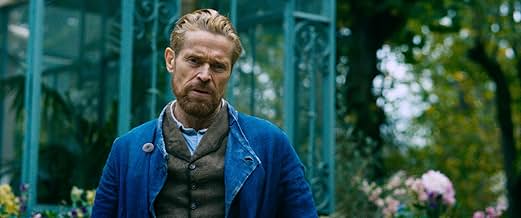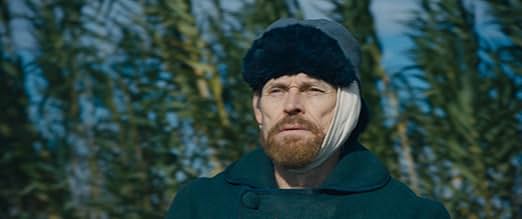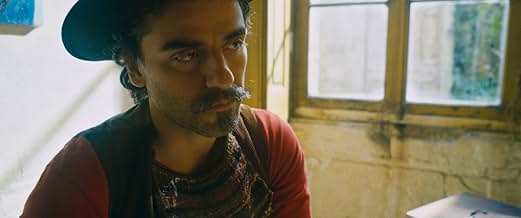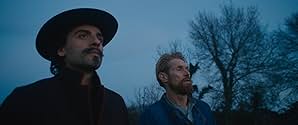A look at the life of painter Vincent van Gogh during the time he lived in Arles and Auvers-sur-Oise, France.A look at the life of painter Vincent van Gogh during the time he lived in Arles and Auvers-sur-Oise, France.A look at the life of painter Vincent van Gogh during the time he lived in Arles and Auvers-sur-Oise, France.
- Director
- Writers
- Stars
- Nominated for 1 Oscar
- 3 wins & 16 nominations total
Clément Paul Lhuaire
- Emile Bernard
- (as Clément Lhuaire)
Alan Aubert
- Albert Aurier
- (as Alan Aubert-Carlin)
- …
- Director
- Writers
- All cast & crew
- Production, box office & more at IMDbPro
Featured reviews
This film succeeds in various ways: Dafoe delivers a marvelous portrayal of van Gogh, and Rupert Friend offers a dignified performance as Theo, his brother. The production design, costuming, and lush landscapes are all outstanding. As someone who has seen most of the films directed by Schnabel, I find him an insightful, astute director, yet I wish he would have introduced more nuance into certain scenes.
The invigorating piano score suffers from an overblown volume at various times. At the pre-release screening, more than a handful of people walked out of the film, midway. I think they were overwhelmed by a dizzy combination of loud music and jumpy, blurred camera techniques. As for me, the approach worked, adding a visceral punch.
Some of the dialogue was culled from Vincent's letters to his brother, and Dafoe rendered the text with a vulnerable immediacy. Several roles were aptly cast, but could have benefited from additional screen time: Isaac (as Gauguin), Almaric (Dr. Gachet), and Seigner (Madame Ginoux).
The invigorating piano score suffers from an overblown volume at various times. At the pre-release screening, more than a handful of people walked out of the film, midway. I think they were overwhelmed by a dizzy combination of loud music and jumpy, blurred camera techniques. As for me, the approach worked, adding a visceral punch.
Some of the dialogue was culled from Vincent's letters to his brother, and Dafoe rendered the text with a vulnerable immediacy. Several roles were aptly cast, but could have benefited from additional screen time: Isaac (as Gauguin), Almaric (Dr. Gachet), and Seigner (Madame Ginoux).
This film tackles the story of an artist creating masterpieces for later generations but not for his own. All the techniques that bothered other reviewers--the handheld camera, loud piano soundtrack, looped dialog--all emphasized a life of loneliness and ridicule that made the audience experience those emotions.
Clearly the story lacked a typical plot, not so much because it wasn't there as much as that Van Gogh's story is so well known and portrayed. I sensed that my companions may have been wishing they had chosen a different movie but for me this film further added to the tapestry of Van Gogh's unique story. Plus the film addresses the two biggest points of contention about him ... his ear and his death ... and suggests that Van Gogh's character traits have turned those into unsolvable mysteries.
Clearly the story lacked a typical plot, not so much because it wasn't there as much as that Van Gogh's story is so well known and portrayed. I sensed that my companions may have been wishing they had chosen a different movie but for me this film further added to the tapestry of Van Gogh's unique story. Plus the film addresses the two biggest points of contention about him ... his ear and his death ... and suggests that Van Gogh's character traits have turned those into unsolvable mysteries.
At Eternity's Gate is an amazing piece of art. I will admit that in order to fully appreciate its artistic offerings one would most definitely need very minor prior knowledge to who Vincent Van Gogh was. What his ideologies were, and the major events of his life, as well as his relationship with his brother. The way lines are repeated multiple times in a way that sounds like an echo chamber to show the audience the way Vincent is perceiving conversation on a delay, rationally speaking. One critique I see a lot is of the very long scenes of Vincent running around in wilderness looking for something to paint, and the overbearing music that surrounds those scenes. I disagree with these critiques but I do understand them. I feel it was necessary to have this music in order for the audience to understand the pure child-like joy Vincent felt while looking for something to paint, and while experiencing nature. I highly recommend this film for any Vincent Van Gogh fans. It is just shy of a perfect movie in my opinion, but I can see why someone would very much disagree with that.
This film doesn't follow the Hollywood structure. It's not a biography like you might expect, and the plot isn't defined. Instead, this is an attempt to get inside Van Gogh's head, and a brilliant one at that. Imagine being the world's greatest artist, with zero validation and constant ridicule by the establishment around you. That's the torturous state of being this film encapsulates and does it with purpose. At times, the cinema language gets more experimental than necessarily to accomplish its goal, but I commend the director for pushing the boundaries of standard filmmaking and letting us inhabit Van Gogh's mind for this brief period. I genuinely felt a loss for this escape from my own mind when Van Gogh passed. I recommend anyone involved with artistic or creative thinking to watch this film.
Rather think of it as a painted film, with one artist (Schnabel) trying to convey what it is to be another (Van Gogh). At Eternity's Gate is an immersion into the world of Van Gogh. Art conveys something about the world and the human condition words can never express. After watching the movie I came to realize other ways of trying to understand Van Gogh and his art fall short of this immersion. If you were to take an audio tour of a Van Gogh exhibit you would not finish the tour with the same feeling or understanding as you might get from watching the movie. Everything about the movie is spare, whittled down to an essential nub. The dialogue doesn't matter. What does matter are the long, silent scenes of Van Gogh in Nature and at home, and the times where he speaks directly to the audience, informing it of what it is to be Van Gogh. The occasionally jumpy camera shots and the overlapping dialogue may not have been completely necessary (and obviously a major turn-off for various other viewers), but they do help to establish what it may have been like to be Van Gogh. Madness? Sure, if that label works for you. Clearly, Van Gogh was different. Mad or not, he had his difficulties fitting in to society, any society. The last 20 minutes or so are the most painterly. After absorbing an hour of background material, all the film and Van Gogh have told you allows you to understand his world. When he talks about light, the screen is flooded with light, but even when the screen turns to gloom, you see the world as Van Gogh did. The walls are painted as they were in the background of a Van Gogh painting. And you the viewer? You sit back and drink it all in.
Did you know
- TriviaWillem Dafoe was 62 when the film was released, 25 years older than Vincent van Gogh, who died at age 37.
- GoofsTheo tells Vincent at the hospital that he is now married. In reality Vincent received a letter from his brother on Dec 23rd 1888, in which he announced his engagement. Vincent feared that his brother would not be able to support him, once married. Additional to this he had the argument with Gaugin that night over Paul leaving. Mentally disturbed by all this he cut his ear off.
- Quotes
Vincent Van Gogh: Maybe God made me a painter for people who aren't born yet.
Priest: Possibly.
Vincent Van Gogh: It is said, Life is for sowing. The harvest is not here.
- Crazy creditsThere's a mid-credits scene, where a Paul Gauguin quote is narrated.
- ConnectionsFeatured in Sven Uslings Bio: 2019 Års sämsta biofilmer (2020)
- How long is At Eternity's Gate?Powered by Alexa
Details
- Release date
- Countries of origin
- Official sites
- Languages
- Also known as
- Van Gogh en la puerta de la eternidad
- Filming locations
- Production companies
- See more company credits at IMDbPro
Box office
- Gross US & Canada
- $2,294,915
- Opening weekend US & Canada
- $92,856
- Nov 18, 2018
- Gross worldwide
- $11,519,666
- Runtime1 hour 51 minutes
- Color
- Aspect ratio
- 2.35 : 1
Contribute to this page
Suggest an edit or add missing content




































